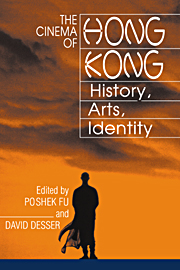Book contents
- Frontmatter
- Contents
- List of Contributors
- Acknowledgments
- Introduction
- Chronology of Hong Kong Cinema
- PART I HISTORY
- PART II ARTS
- PART III IDENTITY
- 9 Between Nationalism and Colonialism: Mainland Émigrés, Marginal Culture, and Hong Kong Cinema 1937–1941
- 10 Urban Cinema and the Cultural Identity of Hong Kong
- 11 Rewriting History: Hong Kong Nostalgia Cinema and Its Social Practice
- 12 Filming Diaspora and Identity: Hong Kong and 1997
- 13 Buying American, Consuming Hong Kong: Cultural Commerce, Fantasies of Identity, and the Cinema
- 14 Hong Kong Electric Shadows: A Selected Bibliography of Studies in English
- Index
13 - Buying American, Consuming Hong Kong: Cultural Commerce, Fantasies of Identity, and the Cinema
Published online by Cambridge University Press: 05 June 2012
- Frontmatter
- Contents
- List of Contributors
- Acknowledgments
- Introduction
- Chronology of Hong Kong Cinema
- PART I HISTORY
- PART II ARTS
- PART III IDENTITY
- 9 Between Nationalism and Colonialism: Mainland Émigrés, Marginal Culture, and Hong Kong Cinema 1937–1941
- 10 Urban Cinema and the Cultural Identity of Hong Kong
- 11 Rewriting History: Hong Kong Nostalgia Cinema and Its Social Practice
- 12 Filming Diaspora and Identity: Hong Kong and 1997
- 13 Buying American, Consuming Hong Kong: Cultural Commerce, Fantasies of Identity, and the Cinema
- 14 Hong Kong Electric Shadows: A Selected Bibliography of Studies in English
- Index
Summary
There is a shot in Wong Kar-wai's Chungking Express (1994) that frames one of the principals (played by Brigitte Lin/Lin Qing-xia, herself a major transnational Chinese star and pop icon), dressed in a blonde wig, raincoat, and sunglasses, standing in front of a shop window. Toys, small electrical goods, and a variety of colorfully packaged gadgets envelop her. Despite her outlandish attire (i.e., blonde tresses framing an Asian face, dark glasses and raincoat when it is neither particularly sunny nor raining), the character blends in perfectly with the backdrop. Disguised as a Marilyn Monroe look-alike, this drug dealer blends in by standing out. She embodies many of the ironies and contradictions revolving around Hong Kong's image as the melting pot of Asia, dealt with in the film. She becomes another aspect of the spectacle of global consumerism that forms the visual foundation for the film's vertiginous bricolage of American pop culture, British colonialism, and Asian commerce. In the background of the same shot, Faye (Faye Wong), the female protagonist of the film's second section, purchases an oversized Garfield stuffed toy. This brings the spectacle of display and the consumption of commodities together in a single image. Running parallel to the film's two love stories is a more general, all-encompassing story of markets, consumers, commodities, packaging, display, promotion, and exchange. The romantic entanglements are juxtaposed with fantasies that revolve more around the marketplace than the heart.
- Type
- Chapter
- Information
- The Cinema of Hong KongHistory, Arts, Identity, pp. 289 - 313Publisher: Cambridge University PressPrint publication year: 2000
- 20
- Cited by



